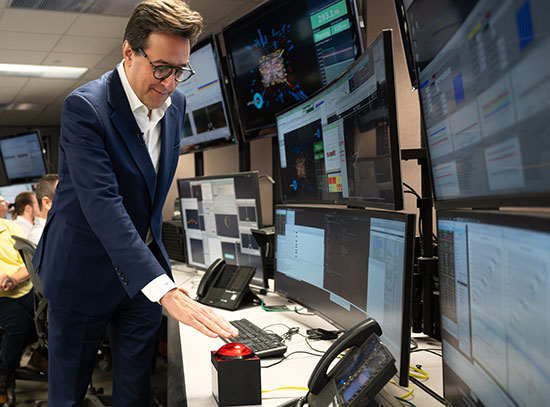Physics Professor Wins $650,000 Grant for Quantum Computing Research
December 14, 2023
By Luanga Junior Kasanga
 enlarge
enlarge
Associate Professor of Physics Prabal Adhikari has been awarded a grant from the United States Department of Energy to establish a quantum computing research program aimed at solving open problems in theoretical nuclear physics while simultaneously diversifying the physics student pipeline.
The following news release was issued on Oct. 13, 2023 by St. Olaf College, a liberal arts institution in Northfield, Minn., announcing a Funding for Accelerated, Inclusive Research (FAIR) award from the U.S. Department of Energy (DOE). St. Olaf is leading the FAIR project, “Towards Simulating Quantum Chromodynamics with External Electromagnetic Fields on Noisy Quantum Computers,” with Brookhaven Lab’s Computational Science Initiative (CSI). The project will develop and implement quantum computing algorithms used to study quantum many-body problems that occur in high energy physics, particularly quantum chromodynamics (QCD), nuclear physics, and condensed matter theory. CSI’s High-Performance Computing (HPC) Group will manage access and training associated with the quantum and classical computing resources used to facilitate the project, as well as mentor students who visit DOE’s Brookhaven Lab during the summer to work on the project. CSI’s HPC Group also will augment the work with expertise in classical lattice QCD simulations and optimal pulse control on quantum computers. CSI HPC Group Lead Meifeng Lin serves as the co-Principal Investigator on the project. For more information, contact: Charity Plata, cplata@bnl.gov, (631) 344-6152.
St. Olaf College Associate Professor of Physics Prabal Adhikari has been awarded a Funding for Accelerated, Inclusive Research (FAIR) grant by the United States Department of Energy (DOE) to establish a quantum computing research program aimed at solving open problems in theoretical nuclear physics while simultaneously diversifying the physics student pipeline.
The grant award, worth $649,978, will be funded for a total of three years and will support FAIR’s aim of building research capacity, infrastructure, and expertise at institutions historically underrepresented in the Office of Science portfolio, including minority-serving institutions and emerging research institutions.
Adhikari, the lead principal investigator (PI) on the project, will use the funding to establish a research group at St. Olaf in collaboration with Brookhaven National Laboratory (BNL) in Upton, New York, that hosts the Relativistic Heavy Ion Collision (RHIC) and is currently at the forefront of utilizing quantum computing methods to study nuclear and particle physics. The project will be performed in collaboration with Associate Computational Scientist Meifeng Lin, the co-PI, who leads the High Performance Computing Group at BNL.
“Broadly speaking, the vision of the project is to use real quantum computers to study problems in nature that cannot be accessed using classical computers or by analytical, pen-and-paper calculations,” Adhikari says. “Alongside studying open problems, the grant will attempt to diversify the quantum computing workforce, which is expected to grow substantially in the coming years as quantum computers become more powerful and reliable.”
The grant will support a semester-long quantum computing research course during the spring semester. Undergraduate physics students will be trained on the workings of ideal quantum computers and will receive an opportunity to work with real quantum devices at BNL during a 10-week summer research program.
Adhikari is a theoretical physicist, specializing in the study of strong interactions, who first joined St. Olaf as visiting faculty in 2015 and after a stint away rejoined as tenure-track faculty in 2020. He has taught courses across the physics curriculum, including Analytical I, Classical Mechanics, Quantum Field Theory, and Statistical Mechanics, and has collaborated with undergraduate students on a wide array of research problems.
The U.S. Department of Energy’s Office of Science is the single largest supporter of basic research in the physical sciences in the United States and is working to address some of the most pressing challenges of our time. For more information, visit https://energy.gov/science.
2023-21608 | INT/EXT | Newsroom









